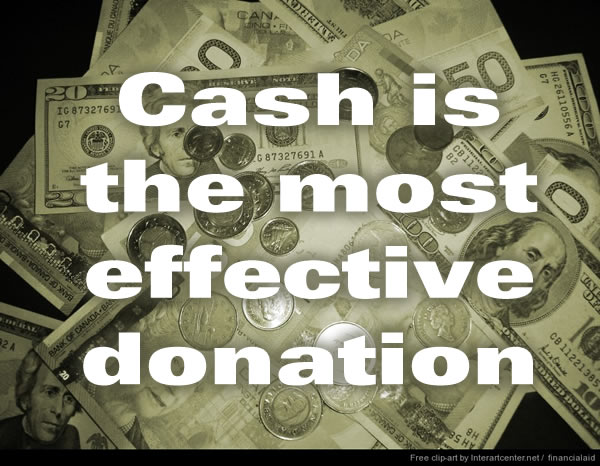
In case the title of this post and the image above haven’t made it clear, let me say it again: if you want to help people in the wake of a disaster, including the people of the Philippines, cash is the most effective donation. You may think it’s a win-win when you donate stuff that’s been sitting on your pantry shelf or in your closet — “I’m feeding people and getting rid of something I’ll never use!” — but time and time again, aid groups have been saying this:
Monetary contributions to established relief agencies are always the most productive public response to disasters.
The line above is straight from USAID CIDI, the U.S. Agency for International Development’s Center for International Disaster Information (CIDI). They’re the experts, so I’ll leave it to them to explain why cash is best in their How Disaster Relief Works article, with some emphasis by me:
When disaster strikes overseas, people who want to help may begin collecting items intended for use in relief operations. It is not unusual for community and civic groups to have collected thousands of pounds of material – typically used clothing, canned food and bottled water – realizing only afterward that they do not know to whom to send the collection, what their transportation options are or whether the items are actually needed. Reasons why these donations are frequently counterproductive are given below. The good news is that the simplest and easiest way to support response efforts is also the most economical and efficient – through cash donations to relief agencies.
Financial contributions allow professional relief organizations to purchase exactly what is most urgently needed by disaster survivors, when it is needed. Cash donations allow relief supplies to be purchased near the disaster site, avoiding the delays, steep transportation and logistical costs that can encumber material donations. Some commodities, particularly food, can almost always be purchased locally – even after devastating emergencies and in famine situations.
Cash purchases also convey benefits beyond the items procured. They support local merchants and local economies, ensure that commodities are fresh and familiar to survivors, that supplies arrive expeditiously and that goods are culturally, nutritionally and environmentally appropriate. In contrast, unsolicited household donations can clog supply chains, take space required to stage life-saving relief supplies for distribution, and divert relief workers’ time. Collections of household goods serve no useful function in the acute phase of an emergency operation. Managing piles of unsolicited items may actually add to the cost of relief work through forcing changes to logistical and distribution plans and creating more tasks for relief workers. Cash contributions to established, legitimate relief agencies are always more beneficial to survivors and to relief operations than are unsolicited donations of commodities.

Want to make a donation? Here are some organizations that are taking money, doing good work, and have been checked out: